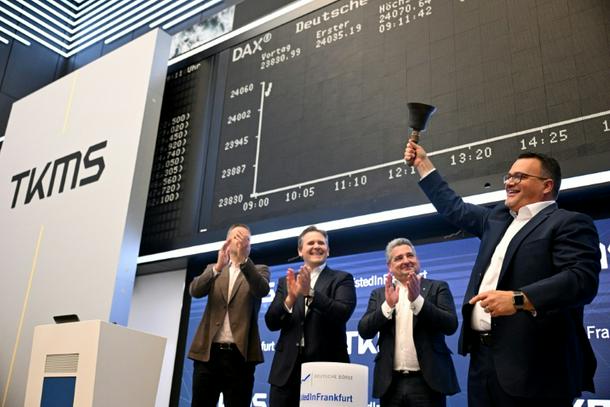
Trading gets underway in German warship maker TKMS in Frankfurt
Frankfurt (Germany) (AFP) - Shares in Thyssenkrupp’s naval unit surged Monday as it was spun off from the German industrial giant, highlighting the buzz around European defence firms as the continent rearms amid a growing Russian threat.
Submarine- and warship-maker TKMS, previously known as Thyssenkrupp Marine Systems, saw its share price jump from around 60 euros ($70) to close at over 80 in Frankfurt, giving the firm a valuation of more than five billion euros ($5.8 billion).
Defence budgets have swelled across Europe, with the region spooked by Russia’s full-scale invasion of Ukraine as well as US President Donald Trump urging Europe to take more responsibility for its security.
“This not only marks a corporate milestone but is also a strong signal for maritime safety and stability,” TKMS CEO Oliver Burkhard said, as trading got underway in Germany’s financial capital.
“This is also important for the future of Europe,” he said, adding that the region wanted to defend its “free, democratic” way of life.
The broader Thyssenkrupp group retains a 51-percent stake in the new company and existing Thyssenkrupp shareholders have received a TKMS share for every 20 shares they hold in Thyssenkrupp.
- ‘Focus on defence’ -
As a standalone company focusing on the defence sector, TKMS and its shareholders are benefitting from the investor interest that has driven the share prices of firms like munitions-maker Rheinmetall and tank gearbox-maker Renk to record highs.
TKMS finance chief Paul Glaser told AFP that the listing would help TKMS access cash to finance the company’s growth and fill orders.
“We’re seeing strong demand for all our products,” he said. “With our own shares we now have our own currency, something that we can use to operate.”
“Before we were part of a conglomerate, now we can really focus on defence,” he added.
Since Russia’s invasion of Ukraine in 2022, Europe has been rushing to build up militaries that have in many cases faced years of neglect.
Germany’s total defence spending is projected to reach 162 billion euros in 2029, more than triple its levels before the war in Ukraine.
Thyssenkrupp, a sprawling conglomerate with businesses in struggling industries such as auto parts and steel, in May said that it would gradually give its businesses more independence to make them more flexible and boost their value.
Thyssenkrupp is also examining an offer by India’s Jindal Steel International for its steel business which is coming under intense pressure from Asian competition.